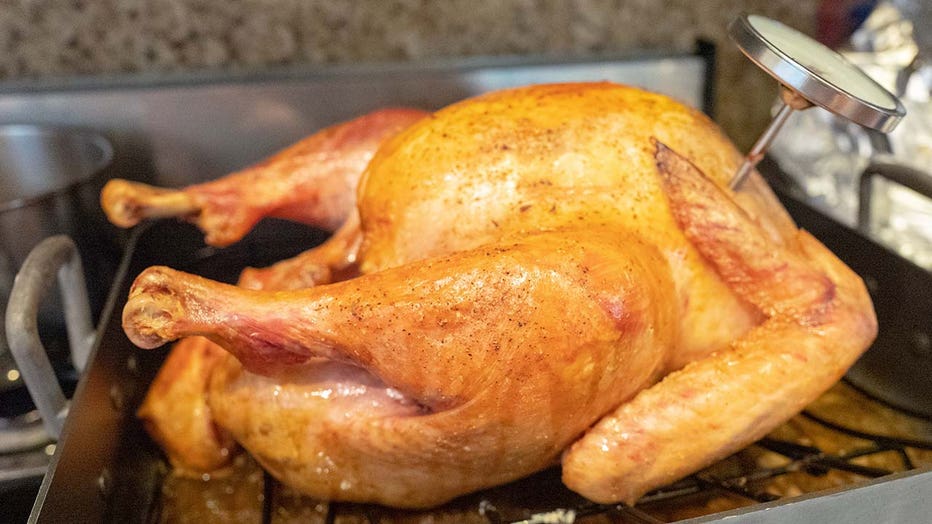Wash your Thanksgiving turkey? Here’s why health experts say no
Thanksgiving dinner will cost more in 2022
The average cost of this year’s classic Thanksgiving feast for 10 will cost about $64.05 or less than $6.50 per person. This is a $10.74 or 20% increase from last year’s average of $53.31.
LOS ANGELES - With the Thanksgiving holiday almost here, the U.S. Centers for Disease Control and Prevention and other health experts have issued tips for safely preparing your turkey — and it doesn’t include washing it.
While one would assume washing anything makes it cleaner and safer, that’s not necessarily the case.
Should I wash my turkey?
According to the CDC, washing your turkey can actually spread germs and bacteria, instead of getting rid of them, and federal agencies have recommended against washing turkey or chicken since 2005.
"Old recipes and family cooking traditions may tempt you to keep this practice going, but it can make you and your family sick," the CDC wrote. "Poultry juice can spread in the kitchen and contaminate other foods, utensils, and countertops."

Cooked turkey in roasting pan with meat thermometer during the preparation of a traditional American Thanksgiving holiday meal, San Ramon, California, November 23, 2019. (Photo by Smith Collection/Gado/Getty Images)
Yet, a 2020 analysis, surveying 3,625 adults in the United States, found that 78% of participants reported washing or rinsing their turkey before cooking, the CDC said.
If you do decide to wash your raw turkey, the agency says to immediately clean and thoroughly sanitize the sink and surrounding area. Keep in mind, one USDA study found that 60 percent of those who washed their raw poultry had bacteria in their sink after washing or rinsing the poultry. Even more concerning is that 14 percent still had bacteria in their sinks after they attempted to clean the sink.
The USDA also notes that washing your hands before and after handling your turkey and its packaging is crucial to avoid spreading harmful bacteria. For extra protection, the USDA says surfaces may be sanitized with a solution of one tablespoon of unscented, liquid chlorine bleach per gallon of water. Be sure to let those areas dry thoroughly.
In addition, use a separate cutting board for raw turkey and never place other foods on a plate or cutting board that has held raw turkey. Wash cutting boards and utensils with hot soapy water.
How to get rid of bacteria on turkey
So, how can you safely get rid of bacteria on your turkey?
Experts say it’s important to thaw your turkey in a container in the refrigerator, in a leak-proof plastic bag in a sink of cold water (making sure to change the water every half hour), or in the microwave, if you own one big enough to accommodate a turkey.
But, don’t think about thawing your frozen turkey on the counter. When a turkey is left at room temperature for more than two hours, its temperature becomes unsafe and may reach "the danger zone" between 40 and 140 degrees Fahrenheit, the CDC says.
RELATED: Thanksgiving 2022: What’s closed, what’s open and where to dine
The only way to destroy bacteria on your turkey is to cook it to a safe minimum internal temperature of 165 °F as measured with a food thermometer. In fact, some chefs even prefer to cook to a higher temperature for flavor and texture. Even if your turkey has a pop-up timer, you should still use a food thermometer to check that it is safely cooked.
Just take the turkey directly from the package to the roasting pan. This way, you limit the mess, and the heat of the oven will kill the bacteria.
Remember to check the turkey’s temperature in the innermost part of the thigh and wing, and the thickest part of the breast to be sure it is free of illness-causing bacteria.
Is there a time you should wash your raw turkey?
According to experts, there is only one time you should wash a raw turkey, and that is after brining it. Otherwise, do not wash a turkey before cooking.
RELATED: Thanksgiving dinner 2022: Breaking down the cost of some of the most popular holiday dishes
If you are brining your turkey, the USDA recommends filling your sink with a few inches of cold water. Place the bird in the sink, and gently run the water to clean out the cavity.
Hold the bird up to drain thoroughly from the cavity into the sink. And place it carefully on the roasting rack.
So, you may not need to wash your turkey on Thanksgiving day, but you will need that thermometer.

